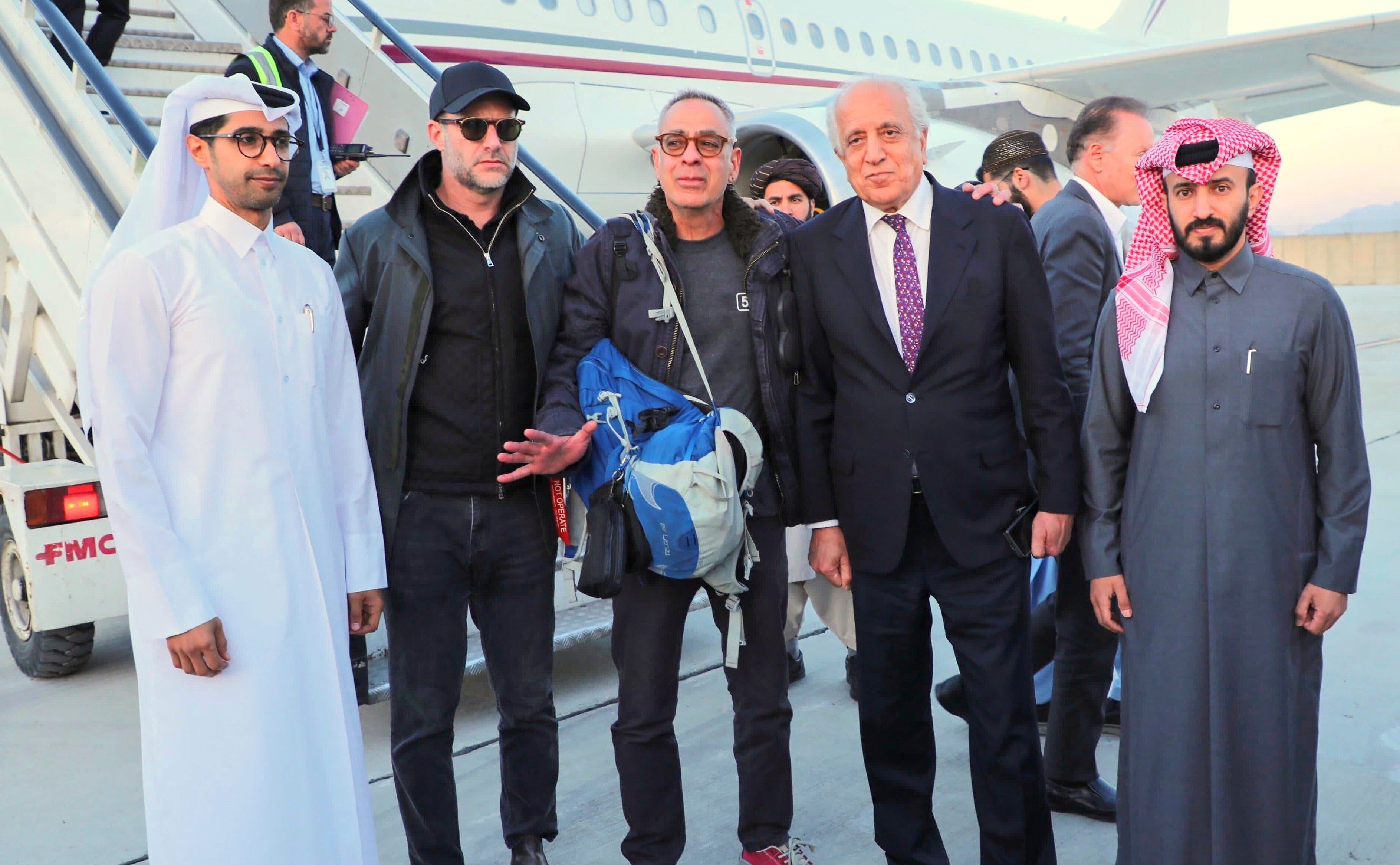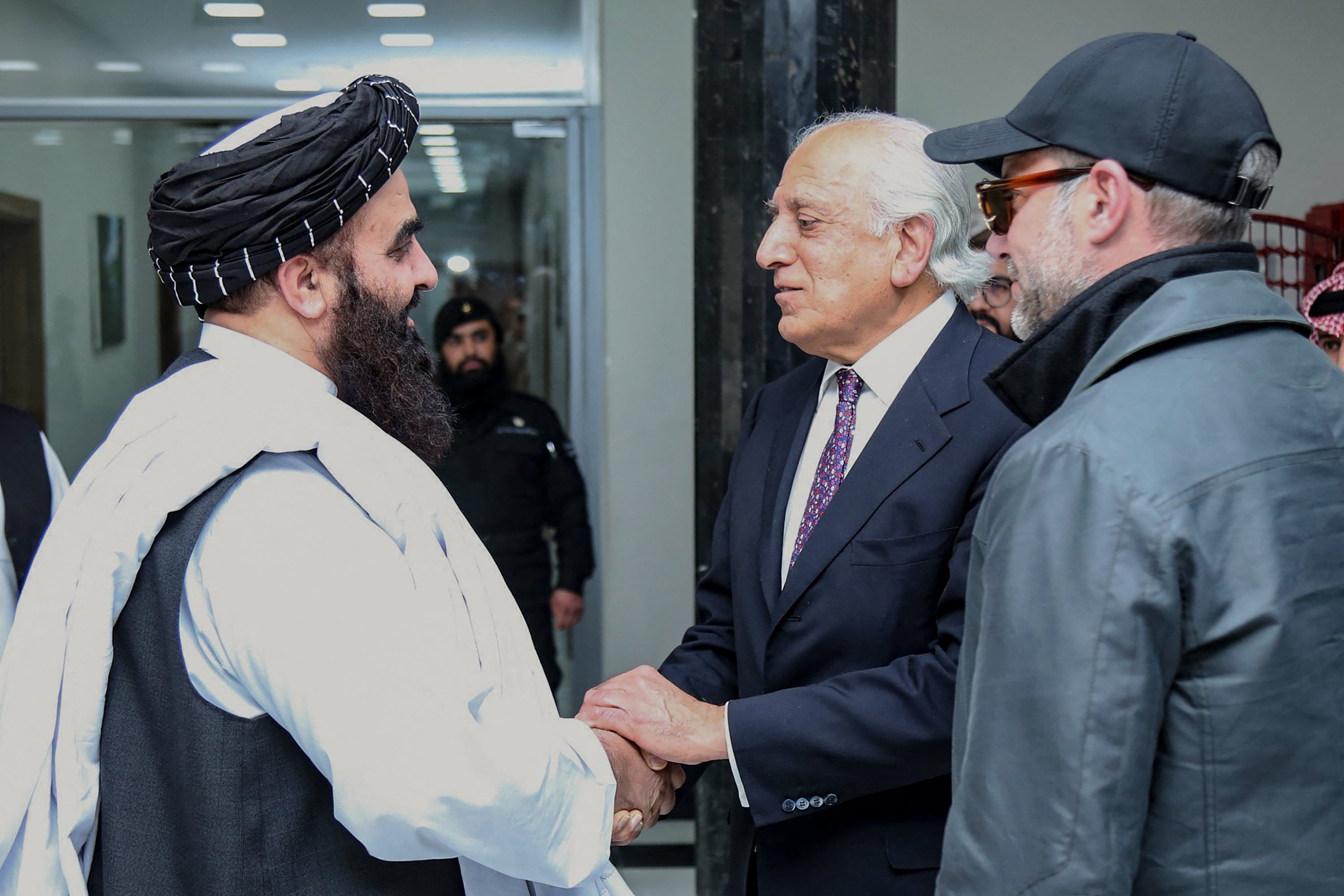Zalmay Khalilzad, the key negotiator in one of the largest US diplomatic debacles in recent memory, could nonetheless be on track to return as Donald Trump’s mediator with the Taliban, experts say.
Last week Khalilzad, an Afghan-born diplomat who was responsible for mediating talks that led to America’s chaotic military withdrawal from Afghanistan, was pictured accompanying an American hostage released from Taliban custody.
Khalilzad appeared alongside George Glezmann, an airline mechanic from Atlanta who was captured by the Taliban in December 2022 during a tourist visit to Afghanistan. Officially, Glezmann was released in a deal with the Trump administration brokered by Qatari negotiators.
But it was Khalilzad who travelled to Kabul, met with the Taliban’s foreign ministry officials and then accompanied the American back to the US. He then took to Twitter to confirm Glezmann’s release, calling it a “good day”.
Experts monitoring Afghanistan say the Trump administration could once again be turning to Khalilzad to deal with the Taliban, including around reported early-stage discussions to reopen the US embassy in Kabul. That would be a major boost in terms of international recognition for the militant regime that has been globally condemned for its assault on women’s rights.
Khalilzad was the “architect” of the Trump administration’s mistaken belief that the Taliban had changed as an organisation since its misogynistic regime of the late ‘90s and early 2000s, before it was ousted from power in the wake of the 9/11 attacks, argues David Loyn, author of The Long War.
“There are talks that Trump might want to send him to Kabul as a full-time envoy. He had an incredibly difficult hand to play in 2019 because Trump wanted an end to the war. It was just like what Americans are doing with Putin now. They are cutting out the main players – Afghan nationals in this case,” Loyn tells The Independent.
“Donald Trump is mainly excited and attracted by how Khalilzad was their negotiator and developed the sense that he could talk to the Taliban on behalf of the Americans as a Washington operator,” says Loyn.
But if they are still listening to his advice now, the Trump administration, in his opinion, are “making a mistake”, he says. “Khalilzad has been wrong and naive about Taliban 2.0 before and there is no reason why his analysis should be any better this time.”
Khalilzad has served as a negotiator with rulers of Afghanistan for more than four decades, including with the Soviets in 1989 when the Russians withdrew from Afghanistan.
He stepped down in October 2021 after serving as the US special envoy for Afghanistan for more than three years under both the Trump and Biden administrations.

Khalilzad was brought onboard by Washington in September 2018 by then secretary of state Mike Pompeo to lead negotiations with the Taliban and the Afghan republic government led by Ashraf Ghani.
A fluent Pashto and Dari speaker, Khalilzad failed to broker a power-sharing deal between the Taliban and Afghanistan’s democratically-elected leaders. Where he did succeed was in negotiating an agreement with the Taliban to end America’s longest-running war, which saw US troops leave Afghanistan after 20 years. The agreement was signed in the Qatari capital Doha and paved the way towards a full withdrawal of foreign soldiers from Afghanistan, as America’s Nato allies had little choice but to follow suit.
A number of officials from the Biden administration blamed the deal negotiated by Khalilzad for forcing their hands when it came to the speed of the pullout, and allowing the Taliban to swiftly take over the country unopposed. The biggest victims of the Taliban’s takeover have been Afghan women, whose fundamental rights on matters such as education and employment have been stripped away.
An active commentator via his X social media account, Khalilzad is regularly met with disapproving remarks from Afghans under his posts. Last week, he advocated for a longer transition period of power in Afghanistan. “You shut up. There is no need (for) your advice,” one user angrily replied.
Khalilzad has admitted that the Nato withdrawal from Afghanistan had not gone as planned, saying this was because the Taliban did not enter serious peace talks with the Afghan government as had been agreed.
But he has repeatedly defended his role in the Doha talks, saying his negotiating position was undermined by public statements and briefings from the White House that America was on the brink of withdrawing from Afghanistan. He told the congressional Committee on Foreign Affairs in November 2023 that “military force” was the biggest source of leverage the US had over the Taliban.
“I would say to our leaders here sometimes that, if we keep saying we're getting out regardless, that doesn't give me a lot of leverage. [They would say] ‘Okay. Understood, Zal.’ But then it would only last a week or two days.”
The Independent has reached out to Khalilzad for comment.

Kabir Taneja, deputy director of strategic studies and a fellow on the Middle East at India’s Observer Research Foundation, says Trump has talked himself into a corner by committing publicly to restoring some form of American influence in Afghanistan. “In the past few months, Trump has made loose remarks about not allowing China and Russia to run amok in the Afghanistan and central Asia region without any American presence, and American weapons left back in Afghanistan,” says Taneja.
“So the only one he can tap into right now is Khalilzad – someone he is familiar with. It is more about familiarity and Trump’s inner circle more than anything else and he is in Trump’s inner circle, clearly.”
Milwaukee mom deported to Laos ‘shaken’ as she faces decades without family in U.S.
Japan disbands Unification Church after investigation into Shinzo Abe’s killing
Chinese state broadcaster airs first visuals of sixth-generation stealth fighter jet
India accused of interfering in Canada’s Conservative Party leadership race
US lifts bounties on senior Taliban figures, Kabul officials say
Britons held by Taliban to face court hearing despite charges remaining unclear







